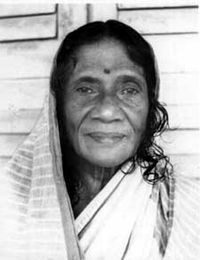
Malati Choudhury was born in 1904 She belonged to a Brahmin family. Her father,
Barrister Kumud Nath Sen died when she was only two and a half years old. Her
mother Snehalata Sen was a good writer who wrote Jugalanjali and translated some
works of Rabindranath Tagore. Malati had a good background. Her maternal grand
father Beharilal Gupta was an ICS officer. Her two cousins Ranjit Gupta was
former Chief Secretary of West Bengal and Indrajit Gupta was the former Home
Minister. Her two brothers were also genius. P. K. Sen was former Income Tax
Commissioner and K. P. Sen was former Indian Postal Service officer. At the age
of 16 Malati Choudhury was sent to Santiniketan where she got admitted to
Viswa-Bharati, founded by Tagore.
She was very lucky that she got the chance to
acquire knowledge directly from Rabindranath Tagore at Santiniketan .Once her
mother wrote, Malati was very happy and benefited much from her residence at
Viswa-Bharati as a student. The personal influence of Gurudev and his teachings,
his patriotism and idealism, have influenced and guided Malati throughout her
life. In Santiniketan, Malati not only obtained degree but also acquired huge
knowledge in various types of art and culture. Malati Choudhury was immensely
influenced by Tagore`s principles of life, views on education and development
and patriotism. Gurudev affectionately called her `Minu`. Malati Choudhury came
in close contact with Nabakrushna Choudhuri who came from Sabarmati Ashram to
study at Santiniketan.She married Nabakrushna Choudhuri in 1927.
After marriage
they settled down in Orissa and started various types of social activities
regarding rural development. They helped poor farmer to improve sugarcane
cultivation. They also started adult education in the surrounding villages. At
the time of Salt Satyagraha Malati Choudhury and her husband plunged into that
and joined Indian National Congress. They were arrested and imprisoned. In the
jails they taught the fellow prisoners and propagated Gandhiji`s thoughts and
views. In 1933 she formed Utkal Congress Samajvadi Karmi Sangh along with her
husband. Later this organization came to be known as Orissa Provincial Branch of
the All India Congress Socialist Party. In 1934, she joined Gandhiji in his
famous padayatra in Orissa. In 1946 Malati Choudhury set up the Bajiraut
Chhatravas at Angul in Orissa and the Utkal Navajeevan Mandal in 1948 at Angul
in Orissa.
Bajiraut Chhatravas was formed to spread education among the children
of the freedom fighters, scheduled castes, scheduled tribes, other backward
classes and under-privileged sections of society. Utkal Navajeevan Mandal mainly
worked for the rural development and tribal welfare in Orissa. Indian government
established The State Resource Centre for Adult Education in Orissa with the
help of Utkal Navajeevan Mandal in 1978. Malati Choudhury also founded the Post
basic School at Champatimunda. Apart from her great role in spreading education
and rural welfare he established herself as a dedicated freedom fighter. She
accompanied Acharya Vinoba Bhave during Bhoodan Movement. Malati Choudhury also
joined Gandhiji during his Noakhali visit. Gandhiji affectionately called her
`Tofanee`.
She led the `Krisaka Andolana`to save the poor farmers from the grasp
of Landowners and Moneylenders. In 1946 Malati Choudhury was selected as the
member of Constituent Assembly of India. She was also elected as the president
of the Utkal Pradesh Congress Committee. After independence she continued to
fight for the cause of backward classes. When her husband served as the Chief
Minister of Orissa she launched various rural reconstruction scheme in Orissa.
When Emergency was promulgated Malati Choudhury protested against the policy of
Indira Gandhi Government and was imprisoned. Malati Choudhury received several
prizes for her dedication to the nation including, National Award for Child
Welfare (1987), Jamnalal Bajaj Award (1988), Utkal Seva Sammaan (1994), Tagore
Literacy Award (1995), Honour by the Lok Sabha and Rajya Sabha on the occasion
of the 50th Anniversary of the first sitting of the Constituent Assembly (1997),
Honour by the State Social Welfare Advisory Board (1997), Honour by the Rajya
Mahila Commission (1997), and the `Deshikottama (D.Litt. Honoris Causa) from her
Alma Mater, Viswa-Bharati.She refused to take Jamnalal Bajaj Award from the
hands of the then Prime Minister Rajiv Gandhi, because she thought Rajiv Gandhi
did nothing to propagate the views of Gandhiji. She passed away in 1997 at the
age of 93.
|